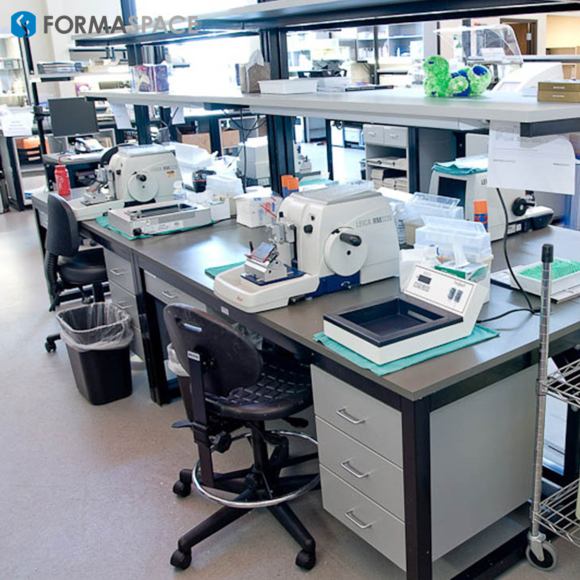As the legal cannabis sales expand to a majority of US states, universities and private schools are starting to offer degrees and certificates designed to support the growing marijuana business – from classes on how to run a cannabis dispensary to technical courses on how to perform chemical analysis of cannabis quality in a marijuana testing laboratory.
The Cannabis Industry is Growing. So too are the Number of Cannabis Related Jobs.
Now that California has joined the ranks of thirty U.S. states that permit some form of legal cannabis sales, analysts are predicting very rapid growth for legal marijuana product sales in the coming decade:
- RBS Capital Markets predicts 17% compound growth (CAGR) for marijuana product sales, with revenues reaching $47 billion by 2028 as major players enter the market. They point to a major investment by Constellation Brands (owner of Corona, Modelo, and Svedka beverage brands) in Canopy Growth, the largest publicly traded marijuana company, as evidence of this trend.
- Arcview / BDS Analytics has a similar prediction. They project that revenues in the North American cannabis market will grow from $9.2 billion in 2017 to $47.3 billion by 2027.
- Bloomberg reports that analyst Cowen & Co expects the legal cannabis market to grow to $75 billion by 2030, which they point out is almost equal to the 2017 revenues for the carbonated soft drink industry.
- Finally, Grand View Research has the most aggressive growth position. They expect that the US legal marijuana market will grow at nearly 25% CAGR between 2017 and 2025. Worldwide, they expect that legal marijuana sales will reach $146 billion by the end of 2025, with medical marijuana sales accounting for 68% of the total.
There is one big caveat of course:
Will the Federal Government crackdown on state governments over cannabis sales?
That remains the billion dollar question. But in the court of public opinion, attitudes toward cannabis legalization are on the rise.
In their April 2018 survey, Quinnipiac University’s poll found that:
- American voters registered their highest ever level of support (67% in favor) for legalizing marijuana in the U.S.
- Survey respondents show overwhelming support (93% in favor) for the use of medical marijuana.
- Voters oppose (70% against) efforts by the Federal government to enforce federal laws in states that have legalized medical or recreational marijuana.
Economics may also influence policy at the Federal level as well, as cannabis jobs become mainstream. New Frontier Data predicts that thanks to the legalization of marijuana sales, the US economy will add more than 250,000 new cannabis-related jobs by 2020.
The ArcView Group projects an even higher number by 2021 — 414,000 cannabis-related jobs. Additionally, they predict that $20.8 billion in marijuana product sales will generate an overall economic multiplier effect of nearly $40 billion, including local and state tax receipts exceeding $4 billion.

Which Cities will see the Highest Demand for Cannabis Industry Jobs?
According to internal research published by the online recruiting company Zip Recruiter, these are the cities which had the highest number of available positions in the cannabis industry:
- Denver, CO
- Los Angeles, CA
- San Francisco, CA
- Seattle, WA
- Portland, OR
- Sacramento, CA
- Spokane, WA
- Miami, FL
- Chicago, IL
- Boston, MA
(Looking for a job in the cannabis industry? Online recruiter Indeed has a listing of available positions.)
Interestingly, the high demand for cannabis industry workers in Denver has resulted in complaints from the restaurant industry that they are out-competing them for workers, such as cooks.
Given that laws regulating marijuana now vary from state to state, what will be the economic impact on the job market nationally? Will people choose to relocate to states where cannabis is legal? For example, would an increasing number of Millennials elect to move to Denver or Seattle (where recreational use of marijuana is legal) to start their careers?
Time magazine investigated this question and found it difficult to determine a clear answer due to a lack of relevant national data. They did, however, uncover anecdotal evidence that points to Baby Boomers and people of retirement age moving to states where medical marijuana sales are legal, such as Colorado or Oregon.
We predict there will be more studies on this in the future to identify any emerging demographic trends.
Seven New Job Categories Created by the Cannabis Industry
Let’s shift gears and talk about preparing for a career in the cannabis industry.
The first thing to know is that the jobs market is broadly divided between two segments, recreational cannabis sales, and medicinal marijuana sales.
- Careers in the recreational cannabis market share many characteristics with those of other consumer-based food and beverage industries. (In fact, there is often a comparison made with the wine industry, which also grows, processes, and delivers a highly regulated product.) Recreational cannabis producers seek to offer products with a compelling combination of superior taste, quality, convenience, distribution, brand image, and pricing that sets them apart in the marketplace. Over time, distinct product categories have emerged in the recreational cannabis sales market as well, including separate sales segments for flowers, concentrates, edibles, pre-rolled, shake/trim/lite, and topical products.
- Careers in the medical marijuana industry may be similar, with the caveat that — commensurate with sales of a doctor-prescribed medication — there is higher-level of regulatory scrutiny and oversight during the growing, testing, packaging, and distribution stages.
Are you a laboratory technician for a cannabis testing lab? Formaspace can help provide you with the proper furniture for all of your ergonomic laboratory workbenches.
Here are seven new job categories to consider if you want a career in the cannabis industry:
1. Cannabis Dispensary Owner / Operator
While the owning or operating a business dispensing cannabis can be lucrative, entrepreneurs face special challenges in this fast-growing marketplace, including federal legal challenges to their business operations (banking regulations are a special concern.) A background in business management is recommended.
2. Cannabis Grow Master
Similar to the role of a viticulturist at a winery, the job of cannabis grow master is to oversee the cultivation of high-quality strains of marijuana plants in outdoor farm settings or specially designed greenhouses. A degree in horticulture or botany will prove useful, as well as experience in growing other types of plants or flowers in a commercial setting.
3. Cannabis Extraction Technician
Continuing with our analogies, the role of a cannabis extraction technician is similar to that of a vintner at a winery or a distiller at a spirits manufacturer. Safely extracting the active ingredients from marijuana plants is a complicated task that’s continuing to evolve as new techniques are introduced. An extensive background in phytobiology and chemical processes is a must.
4. Cannabis Testing Lab Manager / Technician
As we’ve written about before, there is an increasing need for independent cannabis testing laboratories to certify that cannabis products meet state regulations for contamination levels, active ingredient levels, and other product quality standards. If you are contemplating building a cannabis testing lab or expanding your current operations, be sure to contact your friendly Formaspace Design Consultant for tips on how the right lab layouts and custom furniture can help make your operations more successful.
5. Cannabis Compliance Officer / State Inspector
The role of the compliance officer and the state inspector are related in a sense; the former works on behalf of the cannabis producer to ensure that all stages of cannabis sales — from the growing and processing stages to the sales and distribution to customers — are in compliance with GMP (Good Manufacturing Processes) and other regulations governed by state and local authorities. The role of a state inspector is to monitor that these compliance efforts are working in accordance with state law. Job candidates for these positions would benefit from a background in food industry inspection processes and compliance operations.
6. Cannabis Patient Care Coordinators (AKA Budtender)
The role of patient care coordinator in a cannabis dispensary (colloquially known as a “budtender”) has been compared to the role of a pharmacist in a pharmacy. However, this is a misleading comparison, as pharmacists are required to have a much higher level of medical education. Nonetheless, experienced patient care coordinators do offer a valuable service to customers by providing detailed information about the different product options available.
7. Cannabis Edibles Chef
As consumer taste turns to edible cannabis products, there is increased demand for chefs who can develop and prepare unique edible recipes, from infused teas to baked goods made with “cannabutter.” A background in the culinary arts or experience working as a chef in a traditional kitchen is recommended for those wanting to pursue this career.
Can You Earn a Degree in Marijuana Studies? Colleges, Universities, and Online Schools are Rolling Out New Cannabis Education Programs
Now let’s turn to the education programs available to prepare students for jobs in the cannabis industry.
To be honest, that are not as many programs available as you might expect, given the potential economic impact of the cannabis industry on the jobs market. What’s the reason for this? It turns out that conflict between the Federal government and the states that have liberalized their laws to allow the sale and possession of cannabis-based products have put educational institutions in a bind.
Take for example the case of Cannabidiol (CBD), which is a non-intoxicating cannabis extract used for medicinal purposes, such as controlling epilepsy seizures or reducing symptoms of multiple sclerosis (MS). Possession of CBD is allowed in most states, however, the US government still considers CBD to be a controlled substance that’s illegal to possess under federal law.
Because most traditional colleges and universities receive some amount of federal funding, they often have no choice but to follow the more restrictive federal regulations, thus limiting their ability to perform research on cannabis products. As a result, some useful research projects, such as the one at Washington State University where researchers halted development of a marijuana breath test, have had to be canceled. “For this to be effective, we need to be able to test on real people,” said Nicholas Lovrich, WSU Regents Professor Emeritus of Political Science in an interview with The Spokesman-Review newspaper. “Unfortunately, that’s just not possible right now. It’s too much risk to the university.”
(A side effect of the federal regulations limiting cannabis research is that more research may end up moving abroad, to Canada, for example, where marijuana is now legal across the country. As an example, a researcher at the University of British Columbia’s Okanagan campus recently discovered a new approach to measure phytocannabinoids—the primary bioactive molecules in cannabis—that is faster, safer, and more accurate than previous laboratory methods.)
Despite the conflicts here in the US between federal and state regulations, there are a number of traditional colleges and universities – as well as private schools – that are developing courses, certificates and degree programs for those wanting to pursue a career in the cannabis industry. But, as we’ll see, in many cases they are carefully crafting their curriculum to avoid unnecessary scrutiny by the feds.
Currently, the standout program is from Northern Michigan University (NMU), which is offering a 4-year undergraduate degree in Medicinal Plant Chemistry — the first of its kind in the country.
Despite the inevitable jokes about majoring in growing marijuana, students majoring in NMU’s degree program are finding the coursework to be quite rigorous; it includes classes in organic chemistry, plant physiology, botany, accounting, genetics, physical geography, and financial management.
Interestingly, what it does not do is expose students to actual marijuana plants, at least not on campus, thereby avoiding a potential controversy at the publicly-funded institution. Instead, students can intern off campus at one of Michigan’s licensed marijuana growers to get hands-on experience growing and processing cannabis products.
Other education programs and certifications are available across the nation. Here are some of the more well-known programs:
Cannabis Education Programs in California
- Humboldt Cannabis College is a private school that teaches sustainable gardening practices for cannabis. It also provides coursework on the present and future laws and regulations governing its sale. Despite the word College being in the name, the school does not offer accredited courses.
- Oaksterdam University, located in Oakland, California is a private, non-accredited institution offering certificates of study in indoor and outdoor cannabis horticulture as well as business-oriented classes for those pursuing a career operating a cannabis business. The school’s founder was the major sponsor behind the 2010 California Proposition 19 (to legalize cannabis sales in the state). After the proposition narrowly lost, both the school and Lee’s home were subsequently raided by agents of the Federal government. Nonetheless, in 2016, California voters ultimately changed their minds by approving Proposition 64 (the Adult Use of Marijuana Act, or AUMA) which legalized cannabis in California.
Cannabis Education Programs in Colorado
- Denver-based Clover Leaf University offers both on campus as well as online courses. It claims to be the first accredited cannabis educational institution licensed by the Colorado Department of Education’s Private Occupational School Board. Courses include cannabis business practices, cannabis science and testing, culinary arts, legal education, and master grower classes.
- The Grow School, also based in Denver, offers moderately-priced courses either hosted online or in their facilities targeted at individual growers or full-scale operations.
- THC University offers online learning courses that offer certificates for coursework, from basic marijuana growing skills to state safety certificates for Colorado and Washington State. (EDITOR NOTE LINK >
- In 2017, the University of Denver began offering a class titled “The Business of Marijuana” for its students enrolled in their Daniels College of Business, making it the first AACB-accredited business school in the country to offer a course on marijuana.
Cannabis Education Programs in Michigan
- See information on Northern Michigan University above.
Cannabis Education Programs in Mississippi
- The University of Mississippi plays an important role in marijuana education and research as the sole holder of a contract to provide cannabis samples and cannabis-derived products for use in Federal research programs — as part of its participation in the National Institute on Drug Abuse (NIDA) Drug Supply Program.
Cannabis Education Programs in Ohio
Unlike other states that contract with private cannabis testing laboratories, the state of Ohio is turning to its own universities to perform cannabis testing.
- Hocking College has opened its Cannabis Medical Testing laboratory under a provisional license by the Ohio Department of Commerce. The school has also been approved for a new associate degree for Laboratory Technicians in Medical Laboratory and Chemical Laboratory Science. A planned, first-of-its-kind Cannabis Lab Technician degree program is still in the approvals stage.
- Central State University near Dayton also has received a provisional license from the state of Ohio for testing cannabis. It is partnering with Buckeye Agriculture to provide the estimated $2.5 million needed to build a new cannabis testing laboratory facility on campus.
Cannabis Education Programs in Vermont
- The Lerner College of Medicine at the University of Vermont Medical Center (UVM) is the first medical school in the nation to offer a professional certificate in cannabis and medicine. This seven-week, the non-credit course covers aspects of cannabis business, law, and policy, as well as the scientific aspects of plant biology, pharmacology, production, safety, and clinical research.
Cannabis Education Programs in Washington State
- Seattle Central College offers a Medical Marijuana Consultant Certificate Program that is approved by the Washington State Department of Health. Certificate holders satisfy the state’s educational requirements for workers who sell medical marijuana at licensed stores.
Turn to Formaspace for Cannabis Testing Laboratory Solutions
Are you interested in a career working in a cannabis testing laboratory?
Formaspace has helped several laboratory clients build out their own cannabis testing lab operations. We encourage you to read our report on Cannabis Testing Lab Design Tips, where we interviewed Satto Rugg and Nicole Delmage of MerJ Architecture to learn more about best practices for creating a modern, highly-productive cannabis testing laboratory.
If you are planning to build a new testing laboratory or to upgrade your current facility, Formaspace can help.
We advise you on the best practices for creating efficient laboratory layouts, as well as build one-of-a-kind custom furniture for your facility here at our Austin, Texas factory headquarters.
Whether you need a wet lab, tech lab, cleanroom or other specialized laboratory facilities, we can help.
Take the next step. Contact one of our friendly Formaspace Design Consultants today. We’ll be happy to share our extensive experience and help make your laboratory project a complete success.














